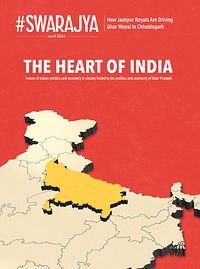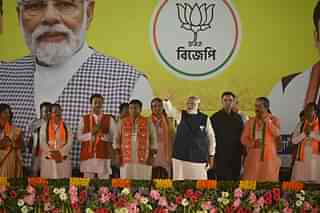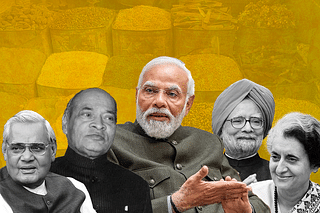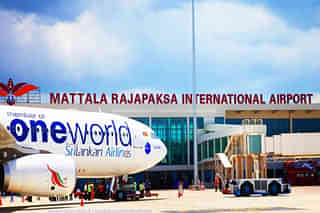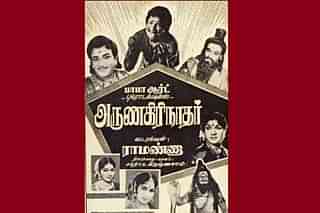Ideas
Why The IAS Needs To Be Reformed
TCA Srinivasa Raghavan
Dec 10, 2017, 08:43 AM | Updated 08:43 AM IST
Save & read from anywhere!
Bookmark stories for easy access on any device or the Swarajya app.

Many members of the Indian Administrative Service (IAS), past and serving, are likely to read this. In order to avoid the usual IAS ploy of “how many centuries have you scored” to pooh-pooh critiquing, let me set out my qualifications at the very start.
At one time, no fewer than eight of my close relatives, including my father and his brother, and my brother-in-law, were in the IAS. My brother and cousin were in the Indian Foreign Service (IFS). And many others were in the other services. My closest friends from school and college have been members of the IAS, Indian Police Service (IPS) and the Allied Services. So, while I may not have worn the shoe, I do know how it fits.
The Indian Civil Service (ICS)
The IAS is the successor service to the ICS, which was meant to serve the British Empire in India. Until the 1870s, British administrators comprised mainly of freebooters from England, who ran things with the help of the military.
But, after 1860, when governance was taken over by the British government, there was a dramatic improvement in the quality of officers, who were now drawn overwhelmingly from Oxbridge. This was the first generation that absorbed the liberal values of fairness, equity and justice. Their story has been told by many, but the most readable account is in Phillip Mason’s The Men Who Ruled India.
The British recruited Indians also. The first Indian was Satyendranath Tagore, yes, from the same family, who joined in 1863. Over the next 100 years, it was this group of British and Indian officers, who came to be known as the “steel frame”. That frame, though, worse for the wear, is still there. For the ICS, running India mostly meant running the districts and the divisions, which were a collection of districts. There were very few jobs in, then capital, Calcutta, or after 1911, in Delhi. Nor were there many jobs for the ICS in the other presidency towns.
If, as Mohandas Gandhi would say much later, India lived in its villages, the ICS ran it from there. The 99 per cent of its job was overseeing law and order and collecting land revenue. The police reported to the ICS men. But the judicial officers didn’t.
As an aside, here lies a little nugget which you will not find in any research paper or treatise. It pertains to the mystique around the notion of an “All India” Service and the faith that the people repose in it. This, in turn, arises from the unshakeable belief that ICS officers were above local politics and acted fairly and impartially. This is the lasting legacy of the white ICS officers that the IAS has inherited. It has remained, more or less, intact.
In 1947, when the British departed, prime minister Jawaharlal Nehru and home minister Sardar Vallabhbhai Patel knew they had to retain this legacy. They decided that the only way to maintain it was not to send an officer to his home state. The ICS notion of a cadre was, thus, rejigged. Over time, however, this principle has been eroded. Overall, however, the job description remained much the same: manage the districts. The definition of “manage” has, however, changed and now includes accommodating and managing the politicians.
In that sense, the IAS is the worst job on earth. The ICS, in contrast, never had to deal with anyone from a position of weakness.
After Independence
Independence brought in innumerable good things, but it also brought in one very bad thing: the politician whose success was measured only by being elected and re-elected. As a result, by the mid-1960s, a major change had occurred. The local politician, member of Parliament (MP), member of legislative assembly (MLA) or just troublemaker, had displaced the Collector and the Superintendent of Police as the de facto boss of the district. This happened because the chief minister sided with the MP/MLA.
On the whole, however, the IAS has coped well with this problem, but at the cost of speed and efficiency and in no longer rare cases, integrity. That sad tale can be told another time.
At first, the politicians behaved themselves and generally cooperated with the district officers. But, by 1980, all that was history. The IAS in the districts and the states became a subordinate of the politician. The masters had turned into servants.
Another major change happened after 1971, when Indira Gandhi won her massive electoral victory. The central government expanded a hundred-fold over the next decade. Its reach into policy, as India became more complex, grew pervasive and more intrusive. As was to be expected, it turned to the IAS to make, manage and execute policy. The consequences have been terrible because persons with zero or near-zero qualifications in the intricate issues of state social, legal, commercial and economic matters were asked to do things about which they had no clue.
They were well-meaning officers, but they brought with them the district management approach: gradualism and minimalism. The idea was to keep things quiet and not let the natives get restless. Ignorance and caution are a deadly recipe for ensuring slow progress.
You only have to read the late Sharad Marathe’s book (1986) or the late P R Rajagopal’s (1989), on policing, to see what the domain experts thought of the policies crafted by the IAS. Marathe was an economist, one of the first members of the Indian Economic Service and Rajagopal, a highly decorated and cerebral IPS officer from the first batch.
Throughout the 1970s and 1980s, the IAS also started grabbing posts and by the end of the 1990s, it had a virtual monopoly on them. This was called encadrement, bureaucratese for “reserved”. The unchallengeable operating principle was that the IAS is the sole and ultimate custodian of public interest, knowledge and wisdom.
Simultaneously, as the complexities increased, and finding themselves out of their depth, they started to rely increasingly on process, procedure and precedent, the last refuge of the inadequate. This expertise – of process, procedure and precedent, was available in the lower bureaucratic reaches of the ministries, where institutional memory resides. Over time, as former Union minister Arun Shourie pointed out once, the whole thing became like a massive traffic jam – very dysfunctional, as the ministries began to work in silos. It continues that way despite Prime Minister Narendra Modi’s best efforts.
Former prime minister Rajiv Gandhi captured this problem the best. In response to a question about the difference between being a pilot and a prime minister, Gandhi told Time magazine that when as a pilot he gave a command, the aircraft instantly obeyed. But as prime minister, he had no idea what happened to his orders.
In a nutshell, the government of India has been (and is) run by amateurs for the last 70 years. It is as if the cabin crew are flying the plane – by trial and error.
Indian Policy Management Service
Over the last few years, I have discussed this issue with friends and relatives mentioned at the beginning of this article. The consensus is that we need a new service, which I would like to call the Indian Policy Management Service. It is described below.
The key lies in specialisation, which has been talked about for over five decades but not given effect to. Partly, this is because no one can agree on how best to do it and partly because of the trade unionist approach of the IAS, which, until Narendra Modi came to power, blocked all such proposals because it didn’t want to give up its postings options. But this generalist approach is completely useless in the 21st century. The “learn on the job” approach is no longer any good. There is far too much to learn.
Recruitment And Deployment
Officers of the policy management service will be recruited from the IAS. After five years in service, they will sit for an examination that indicates their aptitudes. No weights will be attached to individual preferences.
Successful officers will be posted either to state capitals in a department or the central government in a ministry. They will remain there for the next 25 years undergoing periodic re-training in that domain. After 25 years, they will once again be placed in a general pool, so that they can compete for higher posts, like cabinet secretary, on an equal footing.
The remaining officers, those who choose not to take the exam or those who fail, will carry on as before in executive functions. In both cases, domain knowledge will automatically develop and be put to good use.
Precedent Exists
Let me remind those bureaucrats who prefer not to make any change without a precedent, that in 1953, Jawaharlal Nehru had started a service called the Industrial Management Pool. It was eventually sabotaged by the ICS/IAS, which wanted all the key posts in the public sector reserved for themselves.
Even someone as powerful as V Krishnamurthy, former chairman of Bharat Heavy Electricals Limited and Steel Authority of India Limited, was not able to break the IAS stranglehold fully.
It is worth noting that one reason why these two public sector undertakings have done so well is that they kept the IAS out. Conversely, if you look at the ones that are doing badly, including, most notably, Air India, they have been headed for a large part by IAS officers.
What is to be done immediately and for the next 15 years while the new service gets going properly? The answer is simple. Get officers from the states at the deputy secretary level, stop the rotation principle currently in force and enforce specialisation at the state level. The last is critical.
Once an officer joins, say, the Ministry of Textiles as deputy secretary in his 10th year of service, he will stay in that ministry until he turns 55. If that doesn’t make him a domain expert, nothing will. He should be retired. Same in the states.
Incidentally, few people know it, but one of the biggest changes that PM Modi has brought in is to embark softly down this path. Today, nearly 65 per cent of joint secretary level posts are manned by non-IAS people from other services.
It is, if you will, lateral entry. It just needs to be improved and extended.
The Experienced Misfits
IAS officers do things for which they have not been trained and don’t do things for which they have. My family provides a small but perfectly generalisable example of this.
One of my uncles was sent to Harvard for a year in 1963. On his return, he did the following postings – health secretary, Bhopal; divisional commissioner, Jammu; joint secretary, home, Delhi; Board of Revenue, Gwalior; home secretary, Delhi. Like him, another uncle spent a year abroad on a training programme. He also obtained a PhD in agricultural economics. And what were his postings? Health secretary in Patna, about which he knew little and several other postings that had nothing to do with his expertise. Yet another uncle, who was sent to the London School of Economics in 1983, had the same experience.
My brother-in-law acquired expertise in defence and strategic studies between 1970-80, but spent a lot of time as, again, health secretary, chairman Narmada Project etc. This, after spending a year at Harvard in 1984, studying defence and nuclear matters.
On average, each posting for all these people lasted around 30 months. All other relatives have had the same experience. The only exception was my father, whose legal training and experience, from before he joined the service in 1949, was put to full use.
In contrast, in the services that come lower down in status, the so-called “central services”, like income tax, customs, posts etc, the training is put to much better use. There is genuine specialisation there. But until Modi came, they were kept away from policy posts.
How much more absurd can a system get and for how long does the IAS want to retain it?
Save & read from anywhere!
Bookmark stories for easy access on any device or the Swarajya app.
Introducing ElectionsHQ + 50 Ground Reports Project
The 2024 elections might seem easy to guess, but there are some important questions that shouldn't be missed.
Do freebies still sway voters? Do people prioritise infrastructure when voting? How will Punjab vote?
The answers to these questions provide great insights into where we, as a country, are headed in the years to come.
Swarajya is starting a project with an aim to do 50 solid ground stories and a smart commentary service on WhatsApp, a one-of-a-kind. We'd love your support during this election season.
Click below to contribute.
